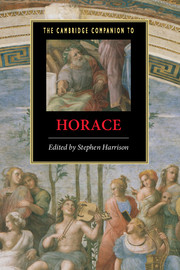Book contents
- Frontmatter
- Introduction
- Part 1: Orientations
- 1 Horace: life and chronology
- 2 Horatian self-representations
- 3 Horace and archaic Greek poetry
- 4 Horace and Hellenistic poetry
- 5 Horace and Roman literary history
- 6 Horace and Augustus
- Part 2: Poetic Genres
- Part 3: Poetic Themes
- Part 4: Receptions
- Dateline of works and major political events
- Works cited
- Index
4 - Horace and Hellenistic poetry
from Part 1: - Orientations
Published online by Cambridge University Press: 28 May 2007
- Frontmatter
- Introduction
- Part 1: Orientations
- 1 Horace: life and chronology
- 2 Horatian self-representations
- 3 Horace and archaic Greek poetry
- 4 Horace and Hellenistic poetry
- 5 Horace and Roman literary history
- 6 Horace and Augustus
- Part 2: Poetic Genres
- Part 3: Poetic Themes
- Part 4: Receptions
- Dateline of works and major political events
- Works cited
- Index
Summary
At first sight the early poetry of Horace may appear to be revisionist in comparison with what was happening to Roman literature in the middle third of the first century bce. The experimentation of Catullus, Calvus and Cinna, for instance, looks programmatically to Alexandria, with each poet producing epyllion and erotic epigram, and with an interest in aetiological topics - some of the chief genres or modes whose development in the third century gives us much of what we consider essential to the Alexandrian poetic achievement. Cornelius Gallus, Propertius and Tibullus created Roman elegy, a genre whose roots are likewise in erotic epigram, Catullan elegiacs and Callimachean poetics; and Virgil’s Eclogues stand as a comprehensive act of Roman Alexandrianism, tied formally to Theocritus, spiritually to Callimachus, and frequently in a complex polemical relationship to Gallus and the nascent genre of elegy. Next to all of this we have Horace’s revival of Archilochean iambic, his new embracing of the Roman genre of satire (if we care to follow Quintilian’s ultimately unuseful taxonomy, satura quidem tota nostra est, Inst. 10.1.93), even his transference to Rome of archaic Greek lyric. All of this might seem to go against the grain. Horatian tastes in the 40s and 30s might on the face of it even seem more Ciceronian than Catullan.
- Type
- Chapter
- Information
- The Cambridge Companion to Horace , pp. 50 - 62Publisher: Cambridge University PressPrint publication year: 2007
- 4
- Cited by

